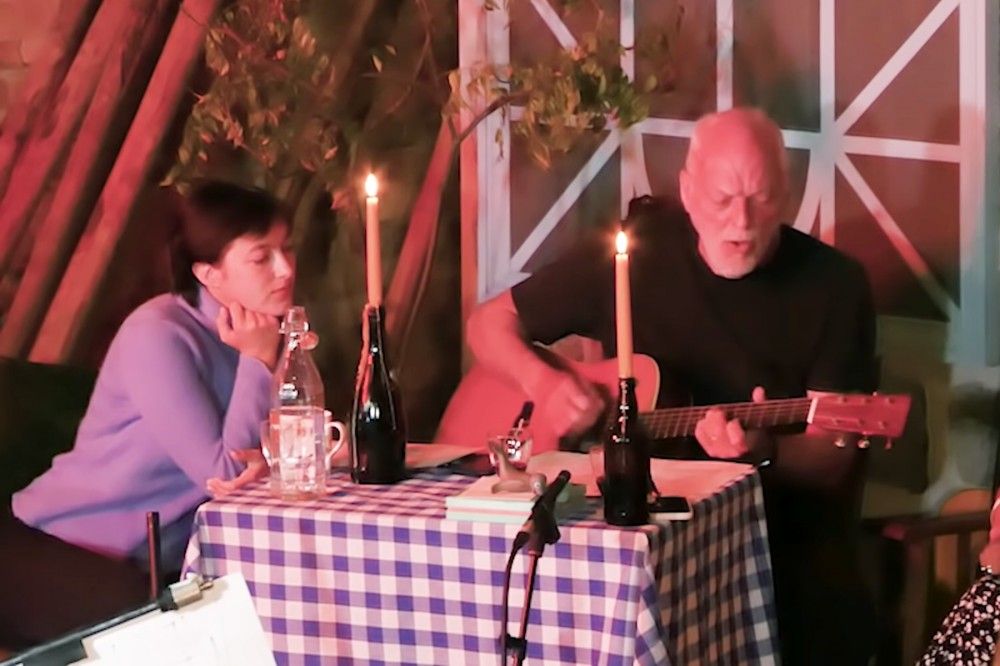
Watch Pink Floyd's David Gilmour Sing Two Syd Barrett Solo Songs
has always worked hard to keep the memory of his predecessor, , alive. Most recently, he paid tribute by covering two tracks by Barrett on a family livestream.
Over the years, Gilmour has kept songs from 1967’s The Piper at the Gates of Dawn as staples in the set lists for both Pink Floyd’s and his solo tours — despite the fact that he didn’t play on that record. And, in 1970, he co-produced two solo albums by Barrett: The Madcap Laughs and Barrett. During the livestream, Gilmour tapped into the material once more, performing Madcap’s only single, “Octopus,” and Barrett’s “Dominoes.”
“Octopus” comes at around the 17:35 mark in the video above, Gilmour strumming the chords and singing Barrett’s typically fantastical lyrics in his deep, husky voice. It’s a more stripped-down affair than Barrett’s original, which featured drums and harmonized vocals.
Gilmour sings “Dominoes,” which has a similarly forceful acoustic-guitar line, at around the 32:50 mark. Barrett’s version of the song featured organ (played by Floyd’s Rick Wright, Gilmour’s co-producer on the Barrett album) and drums (by Gilmour!), plus more psychedelic touches, like sounds in reverse.
Gilmour explained during the family stream that he is editing an upcoming collection of Barrett’s lyrics. “The lyrics have never been printed properly,” Gilmour said. “Syd never wrote them down. They were never properly transcribed. There are all sorts of different versions of all of them.”
As for “Dominoes,” Gilmour said that the lyrics were merely about playing a game of dominoes. He said it was his favorite Barrett song: “There’s something very still about it.”
Elsewhere, he went on to explain the origins of Pink Floyd and how his friendship with Barrett goes back to when they were both 14 years old, as well as how they spent their time in art school. “He was this maverick writer and leader,” Gilmour said. “He was a couple of years younger than the other guys, but he was very, very bright. Somehow, very, very sadly, he lost his mind. There are all sorts of theories as to why he lost his mind, and certainly I suspect it was exacerbated by his drug use. But he was an enormous amount of fun and a brilliant poet.”
As for Barrett’s lyrics, Gilmour said he felt that the artist was often making them up as he went along, since he never wrote them down. “It was very similar to the way that he talked,” Gilmour said. “You’re struggling to get to grips with what he’s meaning. It’s not gobbledygook; they definitely mean something to him, but there’s a sort of a barrier between him and me and anyone else that prevents us from being able to hear it. … That’s what it was like to talk to him in that period, 1969, 1968, ’70.”
Regarding “Octopus,” Gilmour pointed out the line, “The madcap laughed at the man on the border,” and said he suggested The Madcap Laughs as the title of the album. “I think the word ‘madcap’ doesn’t mean mad, it means zany,” Gilmour said. Upon revisiting the master tapes, though, Gilmour said he found out that Barrett had actually sung “the mad cat laughs” — “so I named it wrongly in 1969,” he said.
Pink Floyd drummer Nick Mason — who has been performing many Barrett-era Floyd songs with his band Saucerful of Secrets in recent years — posited a new theory about Barrett’s mental state in a 2016 Rolling Stone interview. “I think perhaps what was happening was Syd had realized he didn’t want to be in a rock band at all,” he said. “He’d done that, decided it wasn’t really what he wanted to do, and probably wanted to go back to art school, but he couldn’t find a way of getting out of it. … I think what was going on was Syd really was trying to leave.”
When Rolling Stone relayed Mason’s opinion to Roger Waters the next year, he said it was possible. “It’s a perfectly decent theory,” he said. “I think that maybe there is something to that, but we’ll never know, because Syd wasn’t making all that much sense by that time, so it’s hard to know where he was at or what he was thinking. We’ll never know.”
Gilmour performs weekly with his family as part of a series called Theatre for Dreamers, named after his wife Polly Samson’s latest book. The family previously has played Leonard Cohen songs.



